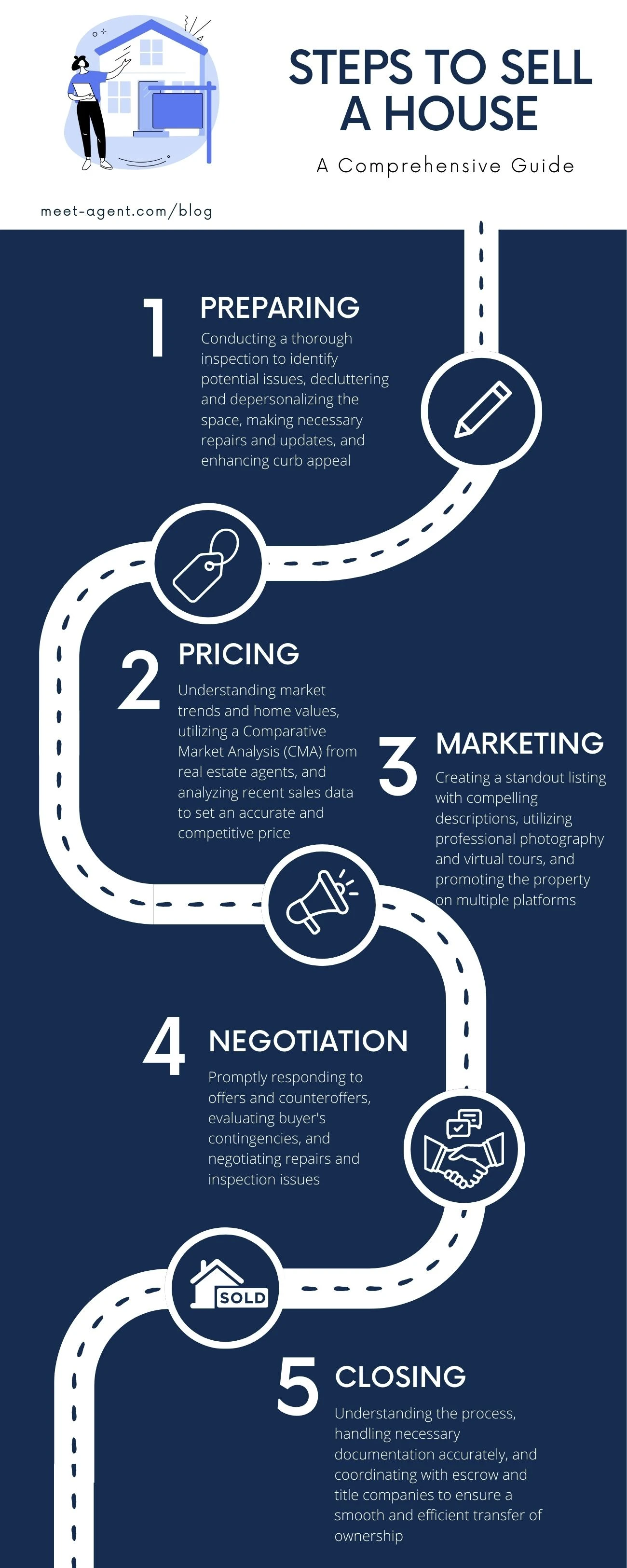Steps to Sell a House: A Comprehensive Guide to a Successful Sale
Selling a house is a significant financial transaction that holds immense importance for homeowners. Whether it's upgrading to a larger property, relocating for job opportunities, or downsizing for retirement, the successful sale of a house can have a profound impact on one's life and financial well-being. According to a report by the National Association of Realtors, the median home price in the United States reached $386,300 in 2022, emphasizing the substantial financial stakes involved in the selling process.1 A successful sale not only ensures that sellers maximize their return on investment but also paves the way for a smooth transition to their next home. With the right strategies and guidance, homeowners can navigate the complexities of the real estate market and achieve their selling goals.

The process of selling a house involves multiple stages and can appear daunting to first-time sellers. From preparing the property for listing to negotiating offers and finally closing the deal, each step requires careful consideration and attention to detail. Understanding the various stages and their interconnectedness is crucial for a seamless selling experience. For instance, a well-prepared house with an accurately determined listing price has a higher chance of attracting potential buyers and receiving competitive offers. By providing sellers with a comprehensive guide to navigate the selling journey, this article aims to empower homeowners to make informed decisions and achieve success in their real estate endeavors.
Before diving into the intricacies of the selling process, it is vital for sellers to set the stage for a smooth and successful sale. This entails conducting a thorough inspection of the property to identify any necessary repairs or updates, decluttering and depersonalizing to showcase the home's potential to buyers, and enhancing curb appeal to create a lasting first impression. According to the reports, 77% of buyers' agents believe that staging a home positively influences potential buyers' perceptions.2 Additionally, establishing a reasonable timeline, gathering essential documents, and seeking advice from experienced real estate agents are essential steps in preparing for a successful sale. By laying the groundwork for a well-executed selling strategy, homeowners can increase their chances of attracting qualified buyers and achieving a smooth and efficient sale process.
Step 1: Preparing Your House for Sale
Conducting a Thorough Inspection
The first step in successfully selling a house is conducting a comprehensive inspection to identify any potential issues that might affect the property's marketability. Hiring a professional home inspector can provide valuable insights into the condition of the house, helping sellers address hidden problems before listing the property. By proactively addressing these issues, sellers can avoid surprises during the selling process and instill confidence in potential buyers regarding the property's condition.
Decluttering and Depersonalizing
Creating a welcoming and inviting atmosphere is essential to attract potential buyers to the property. Decluttering and depersonalizing the house can significantly enhance its appeal and allow buyers to envision themselves living in the space. Removing personal items, excess furniture, and unnecessary clutter can make rooms appear more spacious and highlight the property's key features.
Decluttering and depersonalizing the house can significantly enhance its appeal and allow buyers to envision themselves living in the space.
Making Necessary Repairs and Updates
Addressing any necessary repairs and updates is crucial to present the house in its best condition. Buyers are more likely to be attracted to a well-maintained property that requires minimal immediate attention. From fixing leaky faucets to repainting walls and replacing outdated fixtures, every detail counts in creating a positive impression. By investing in essential repairs and updates, sellers can position their property competitively in the market and potentially receive higher offers from discerning buyers.
Enhancing Curb Appeal
The exterior of the house is the first thing potential buyers see, making curb appeal a critical factor in creating a lasting impression. Improving the property's curb appeal can significantly influence a buyer's decision-making process. Therefore, it's essential to invest in tasks such as landscaping, painting the front door, and maintaining the driveway to enhance the property's overall appeal and draw buyers into exploring the interior. A well-maintained exterior signals to buyers that the house has been cared for and is worth considering as their future home. By prioritizing these steps in preparing the house for sale, homeowners can lay the foundation for a successful and attractive listing that captures the attention of potential buyers and maximizes the property's selling potential.

Step 2: Determining the Right Listing Price
Understanding Market Trends and Home Values
Setting the right listing price is a critical step in achieving a successful sale. To determine an accurate and competitive price, sellers must first understand current market trends and comparable home values in their area. Analyzing recent sales data of similar properties can provide insights into how the local real estate market is performing and what buyers are willing to pay. For instance, data from a reputable real estate database showed that in the past six months, homes in a particular neighborhood with similar square footage and amenities have sold for an average price range of $350,000 to $380,000. Being aware of such data allows sellers to gauge the current demand and supply dynamics in the market and make an informed decision about the listing price.
Analyzing recent sales data of similar properties can provide insights into how the local real estate market is performing and what buyers are willing to pay.
Getting a Comparative Market Analysis (CMA)
A Comparative Market Analysis (CMA) is a valuable tool that real estate agents use to estimate a property's value based on recent sales of similar homes in the area. By conducting a CMA, sellers can receive a more accurate assessment of their property's worth in the current market. Real estate agents analyze various factors, such as location, property size, condition, and recent sales prices, to determine a fair and competitive listing price. For instance, a CMA may reveal that a seller's home, due to its prime location and recent renovations, falls within the higher range of the average price for similar properties. Armed with this information, sellers can confidently set a listing price that aligns with market trends and attracts potential buyers.
Consulting with Real Estate Agents
Seeking guidance from experienced real estate agents is crucial in determining the right listing price. Real estate agents have a deep understanding of the local market and access to up-to-date data on recent sales and market trends. They can provide sellers with valuable insights into pricing strategies that can maximize the property's selling potential. For example, an agent may recommend pricing a property slightly below the market average to generate multiple offers and create a sense of urgency among buyers. Alternatively, they may suggest a higher price for a property with unique features that set it apart from other listings. Consulting with real estate agents ensures that sellers receive expert advice tailored to their specific property and local market conditions, ultimately helping them make an informed decision on the listing price that optimizes the chances of a successful and profitable sale.
Step 3: Marketing Your Property Effectively
Creating a Standout Listing
Effectively marketing your property starts with creating a standout listing that captures the attention of potential buyers. Craft a compelling property description that highlights the unique features and selling points of the home. For example, if the property boasts a recently renovated kitchen with top-of-the-line appliances and custom cabinetry, emphasize how it adds both functionality and aesthetic appeal to the space. Including specific details like the presence of a spacious backyard or proximity to schools and amenities can also pique the interest of buyers looking for specific criteria. Data from a leading real estate agency suggests that well-crafted property descriptions can increase the likelihood of attracting qualified buyers and result in a faster sale at a competitive price.
Craft a compelling property description that highlights the unique features and selling points of the home.
Utilizing Professional Photography and Virtual Tours
In today's digital age, high-quality visual content is essential to grab buyers' attention. Utilizing professional photography and virtual tours can significantly enhance the appeal of your property. Professional photographs can highlight the property's best features, ensuring that it stands out in online listings and marketing materials. Additionally, providing virtual tours allows potential buyers to virtually explore the property from the comfort of their homes, giving them a more immersive experience. Research shows that listings with professional photographs and virtual tours receive more clicks and engagement, increasing the chances of attracting serious buyers who are genuinely interested in the property.
Promoting the Property on Multiple Platforms
To maximize the property's exposure, ensure that it is promoted on multiple platforms. Listing the property on reputable real estate websites, such as Zillow, Realtor.com, and Trulia, can expand its reach to a broader audience of potential buyers. Additionally, leveraging social media platforms like Facebook, Instagram, and LinkedIn allows you to target specific demographics and reach potential buyers who may not have considered your property otherwise. Real estate agents also play a vital role in promoting the property through their professional networks and connections with other agents. By employing a multifaceted marketing approach, you can increase visibility and attract a diverse pool of buyers, increasing the likelihood of finding the right match for your property.
Step 4: Navigating the Negotiation Process
Responding to Offers and Counteroffers
As offers start coming in, it's crucial to approach the negotiation process with care and consideration. Promptly responding to offers and counteroffers can signal your seriousness as a seller and keep the negotiation momentum going. When evaluating offers, look beyond just the sale price and consider other factors, such as the buyer's financing terms and proposed timeline. For example, if a buyer presents an offer with a competitive price and a pre-approved mortgage, it may indicate a strong potential to close the deal smoothly. However, suppose another buyer comes forward with a slightly lower offer but with a more flexible closing date that aligns better with your plans. In that case, it could be worth considering their offer, especially if it avoids the need for a temporary housing arrangement or aligns with your relocation timeline.
Evaluating Buyer's Contingencies
During the negotiation process, carefully evaluate any contingencies included in the buyer's offer. Common contingencies may involve the property passing a home inspection, the buyer securing financing, or the sale of the buyer's current home. While some contingencies are standard and necessary to protect both parties, others may be negotiable. For example, if a buyer includes a contingency that requires the sale of their current home before finalizing the purchase of yours, you may want to consider whether you're willing to wait for their home sale to proceed. Weigh the pros and cons of accommodating contingencies, as removing or adjusting them can impact the speed and certainty of the transaction.
During the negotiation process, carefully evaluate any contingencies included in the buyer's offer.
Negotiating Repairs and Inspection Issues
After the home inspection, the buyer may raise concerns about the property's condition and request repairs or concessions. This is a crucial moment in the negotiation process where open communication and fair compromise are essential. Consider addressing necessary repairs that could significantly impact the property's value or safety. For instance, if the inspection identifies a leaky roof or a malfunctioning HVAC system, addressing these issues can instill confidence in the buyer and reduce the likelihood of negotiation delays or cancellations. On the other hand, some inspection issues may be relatively minor, such as cosmetic imperfections or small maintenance tasks. In such cases, offering a credit to the buyer to handle these repairs on their own may be a suitable compromise. Being flexible and understanding during the negotiation of repairs and inspection issues can foster goodwill and lead to a more successful and amicable sale process.
Step 5: Closing the Deal
Understanding the Closing Process
As you approach the closing stage, it's essential to have a clear understanding of the closing process and the timeline involved. The closing process typically involves various parties, including the buyer, seller, real estate agents, lenders, and title or escrow companies. During this stage, all necessary paperwork and financial transactions are finalized, and ownership of the property is transferred from the seller to the buyer. Understanding the steps involved in the closing process can help you navigate through potential challenges and ensure a smooth and successful closing.
As you approach the closing stage, it's essential to have a clear understanding of the closing process and the timeline involved.
Handling the Required Documentation
Closing on a property requires significant documentation, and ensuring all paperwork is complete and accurate is crucial to a successful sale. This documentation may include the sales contract, property disclosures, title search reports, loan documents, and any required legal paperwork. For example, a study conducted by the National Association of Realtors found that one of the top challenges faced by home sellers during the closing process is handling paperwork and understanding the legal requirements. Working with a knowledgeable real estate agent or attorney can help ensure that all the necessary documentation is in order, reducing the risk of delays or complications during the closing.
Coordinating with Escrow and Title Companies
During the closing process, coordination with escrow and title companies is essential. These companies play a vital role in facilitating the transfer of funds and ensuring a clear title for the property. For instance, the escrow company acts as a neutral third party that holds the buyer's funds and disburses them according to the agreed-upon terms. The title company conducts a thorough search of the property's history to ensure there are no liens or claims that could affect the title transfer. A study by the American Land Title Association revealed that title issues are one of the leading causes of closing delays. By proactively working with reputable escrow and title companies and addressing any title issues that may arise, you can minimize the risk of last-minute complications and ensure a smooth and efficient closing process.

Step 6: Moving On to Your Next Home
Preparing for the Move
As you finalize the sale of your current home, it's essential to start preparing for your move to the next property. This involves organizing the logistics of the move, such as selecting a moving company or making arrangements for a DIY move. According to a study by the American Moving & Storage Association, the average cost of a professional interstate move for a four-bedroom house is approximately $4,300. Planning ahead and obtaining quotes from moving companies can help you budget for this expense and ensure a smooth transition to your new home.
Organizing and Packing
The moving process can be overwhelming, but effective organization and packing can ease the burden. Start by decluttering and getting rid of items you no longer need, as this will reduce the number of things you have to pack and move. Consider donating or selling usable items to lighten your load. Additionally, labeling boxes and packing room by room can make unpacking in your new home more efficient. By adopting these practices, you can streamline your move and settle into your new home with ease.
Finalizing the Sale and Transitioning to the New Property
Once the sale of your current home is complete, you can begin the process of transitioning to your new property. This may involve coordinating with the buyer's schedule for the final walkthrough and handing over the keys. Simultaneously, you will need to handle any outstanding financial matters related to the sale, such as paying off your mortgage and settling closing costs. According to the National Association of Realtors, the median time it takes to sell a home in the United States is 18 days from listing to contract, and the average closing period is around 30-45 days. By staying organized and communicating effectively with all parties involved, you can ensure a seamless handover and focus on settling into your new home.
Conclusion
In this comprehensive guide, we have explored the essential steps to a successful house sale, empowering you with the knowledge and strategies needed to navigate the real estate market confidently. By following these steps, you can optimize your chances of securing a favorable deal and maximizing the value of your property.
Throughout the article, we highlighted the importance of thorough preparation, accurate pricing, effective marketing, skilled negotiation, and smooth closing to achieve a successful home sale. Conducting a thorough inspection, decluttering, and making necessary repairs can enhance your home's appeal and attract potential buyers. Understanding market trends, obtaining a Comparative Market Analysis (CMA), and consulting with real estate agents will help you determine the right listing price. Employing standout listings, professional photography, and multi-platform promotion can ensure your property receives the attention it deserves. Navigating the negotiation process requires responsiveness and careful consideration of buyer's contingencies, leading to mutually beneficial agreements. Lastly, handling the closing process diligently and preparing for your move will culminate in a seamless transition to your new home.
As you embark on this exciting endeavor, consider consulting with experienced real estate professionals who can provide personalized support and expertise throughout the process.
Now armed with valuable insights and expert advice, we encourage you to embark on your house selling journey with confidence. The real estate market can be dynamic and challenging, but with the right approach, you can achieve your goals and secure a successful sale. Remember that each property and market is unique, and it's essential to tailor your strategies to your specific circumstances. Whether you're downsizing, relocating, or upgrading to your dream home, these steps will serve as a guide to selling your house effectively. As you embark on this exciting endeavor, consider consulting with experienced real estate professionals who can provide personalized support and expertise throughout the process. By leveraging your newfound knowledge and seeking professional assistance when needed, you can set the stage for a rewarding and prosperous home selling experience.
Looking for local agents?
Search, compare and connect with top-ranked agents. Find the best local agent & lower rates.



